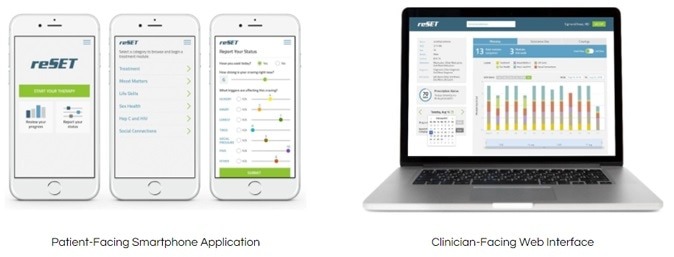FDA clears first CBT-based digital therapeutic to treat substance abuse disorders

reSET® for Substance Use Disorder. Image Credit: Pear Therapeutics
__________
The FDA just approved the first app for treating substance abuse (CNBC):
“The app, developed by a start-up called Pear Therapeutics, is designed to be prescribed by clinician and used alongside counseling.
Pear’s technology digitizes a form of talk therapy called cognitive behavioral therapy, or CBT, which focuses on “examining the relationships between thoughts, feelings and behaviors”, according to the National Alliance on Mental Illness.
Studies have found that CBT is an effective treatment for substance use disorders, and recent research suggests that it can be administered online via a desktop or mobile app. Abuse of tobacco, alcohol and illicit drugs costs more than $740 billion annually in the U.S. alone. Drug-related deaths have tripled since 2000, according to the National Institute on Drug Abuse…As part of the approval process, which McCann said took several years, the FDA also created a new classification for digital therapeutics that are deemed low to moderate risk. That will likely make it easier for other apps to follow suit. Currently, digital therapeutics are being developed to help treat insomnia, opioid dependence, chronic disease and more.”
FDA permits marketing of mobile medical application for substance use disorder (FDA news release):
“Today, the U.S. Food and Drug Administration permitted marketing of the first mobile medical application to help treat substance use disorders (SUD). The Reset application is intended to be used with outpatient therapy to treat alcohol, cocaine, marijuana and stimulant SUDs. The application is not intended to be used to treat opioid dependence.
“This is an example of how innovative digital technologies can help provide patients access to additional tools during their treatment,” said Carlos Peña, Ph.D., M.S., director of the Division of Neurological and Physical Medicine Devices in FDA’s Center for Devices and Radiological Health. “More therapy tools means a greater potential to help improve outcomes, including abstinence, for patients with substance use disorder.”
News in Context
- The FDA creates new Digital Health unit to reimagine regulatory paths in the age of scalable, AI-enhanced innovation
- Five reasons the future of brain enhancement is digital, pervasive and (hopefully) bright
- 2017 SharpBrains Virtual Summit: Brain Enhancement in the Digital Age (December 5–7th, 2017)


